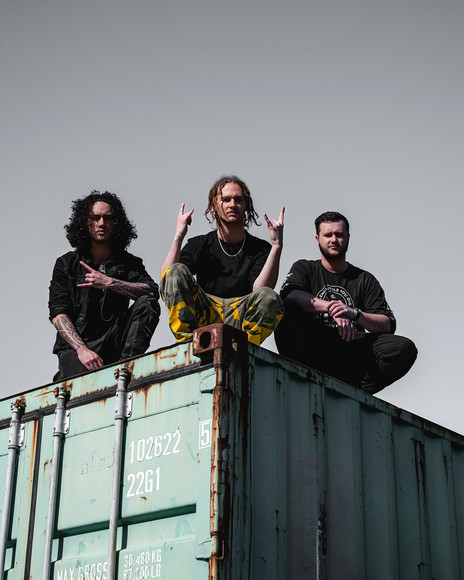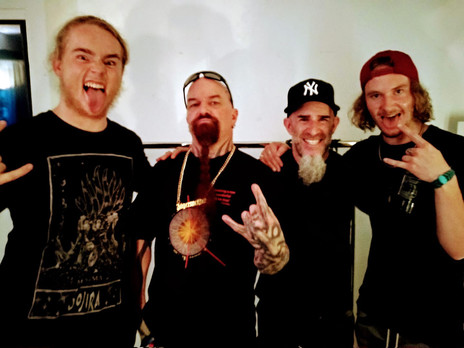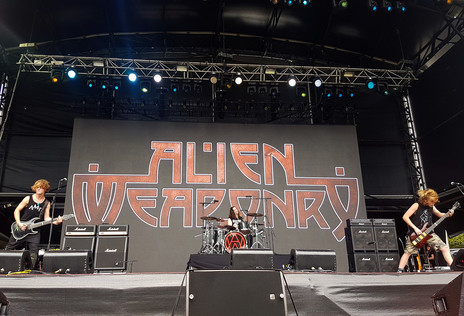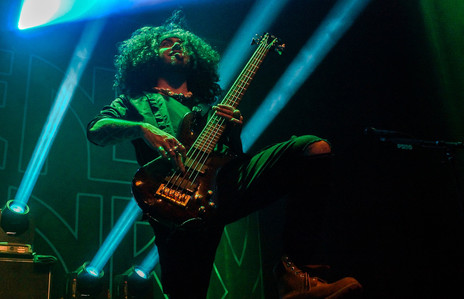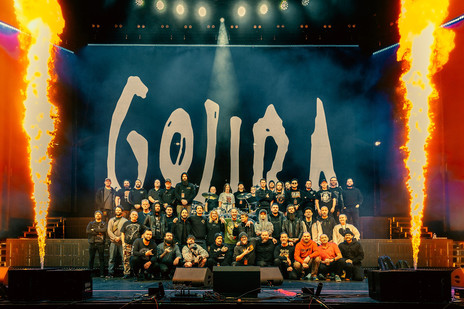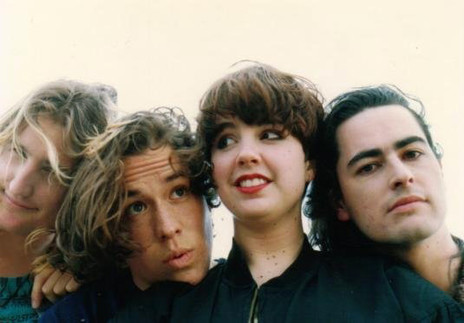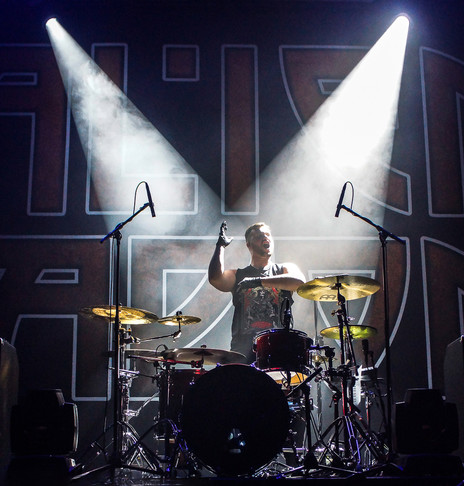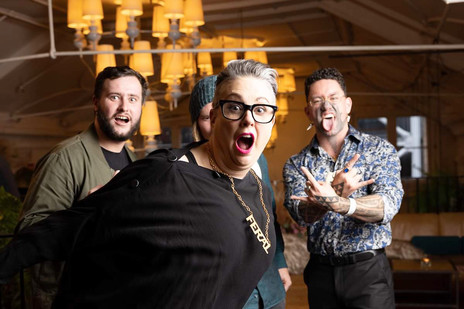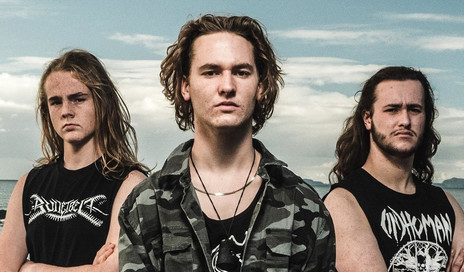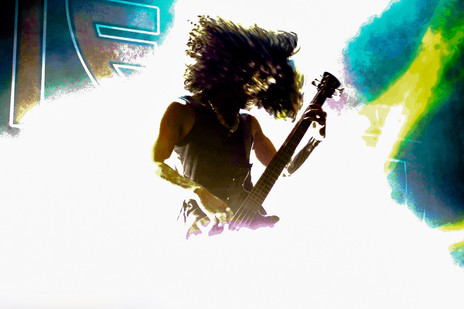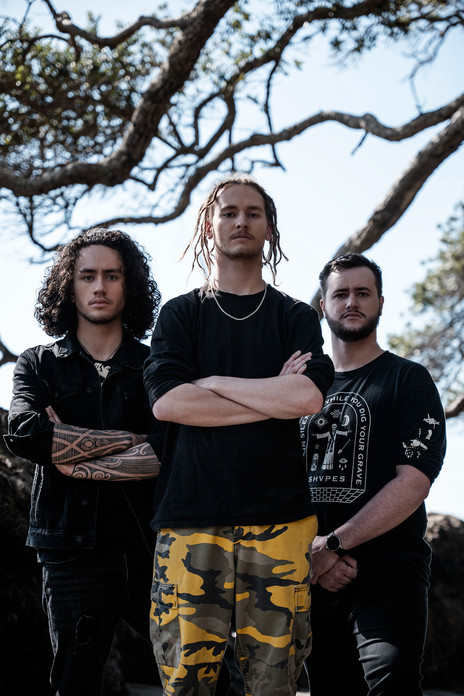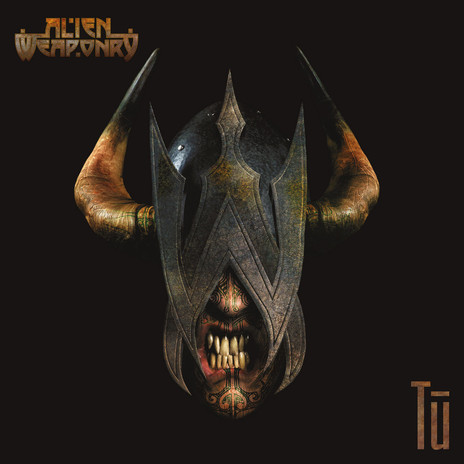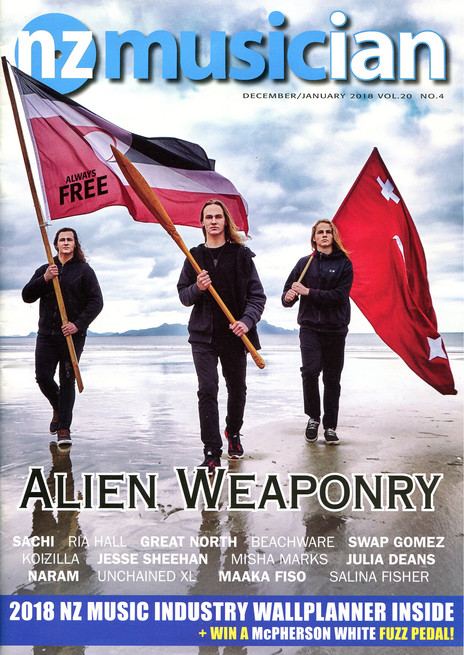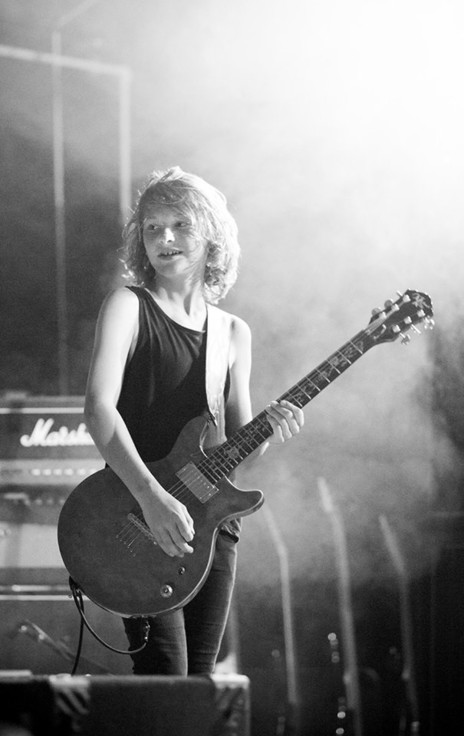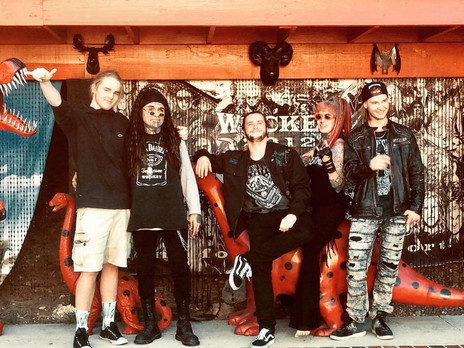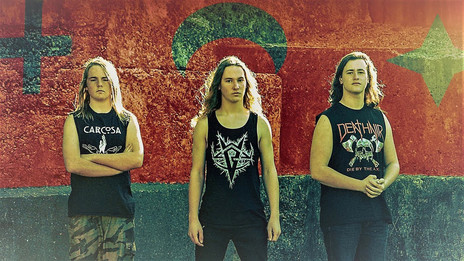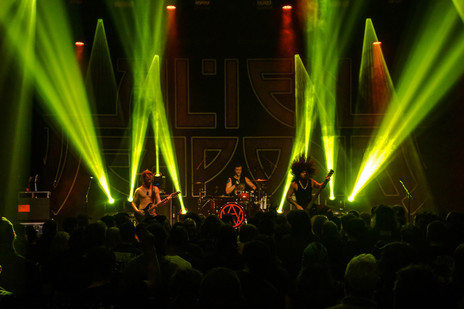Their home was filled with instruments as their father Niel de Jong was also a musician. He was formerly the singer/guitarist of new wave group Ebony Sye, known for their “new romantic” look. Their run from 1984-89 included a full-length album, If You Want To Be King (1987). Niel then formed indie/funk/grunge act Voodoo Love, which had Victoria Kelly on keyboards, oboe, and backing vocals.
Voodoo Love folded after a short run and Niel focused on music production work, which included mastering local releases of overseas albums for Stebbing Recording Studios. Niel always had a strong connection to his Māori whakapapa through his grandmother, a fluent Māori speaker and storyteller. It was natural that he enrolled his two boys into kura kaupapa Māori, as well as encouraging them to learn the language and find out more about the history of her whānau, the Ngāti Pikiao iwi and the wider Te Arawa iwi.
Lewis and Henry first performed as a duo by covering ‘War Pigs’ by Black Sabbath. Around this time, they also came up with the name Alien Weaponry as a nod to the film District 9. At the time, the family experienced a financial setback that led them to sell their Auckland home and move into an isolated and dilapidated farmhouse in Waipu, south of Whāngarei.
Alien Weaponry’s first performance took place at Bream Bay College, Ruakākā
Henry started at Bream Bay College, Ruakākā, in Year 8. He wanted to enter Smokefreerockquest with his brother, but struggled to find a bassist until his music teacher introduced him to Wyatt Channings, who was a couple of years older. This led to Alien Weaponry’s first performance taking place at the school.
They took part in their first Smokefreerockquest with Channings, but soon hooked up with a bass player nearer to their own age, Ethan Trembath. They were fans of the heavy music that was coming out at that time in the early 2000s, with Lewis citing Lamb of God as an influence, while Ethan was a huge fan of Trivium. They appreciated music with a message, whether it was a rock band like Rage Against The Machine or rap/ hip hop acts like Public Enemy and Che Fu.
Alien Weaponry Unleashed
Alien Weaponry filmed their next entry video for Smokefreerockquest using the warehouse of Zego Sports Boats, where Trembath’s uncle worked. They set up a six-track portable recorder to capture the songs they played and the rough demos were released as the Zego Sessions in August 2014. The song ‘Cages’ reached Paul Martin, who played it on his Rock FM radio show, The Axe Attack. Then he asked them to support his band Devilskin, at the Woolshed Tavern in Reporoa and for two gigs in Mt Maunganui. Henry was still only 14, while Lewis and Ethan were 12 when they played this show.
Alien Weaponry’s early songs were written in English but they were inspired by seeing reggae band Strangely Arousing performing an original song in te reo Maori as the showcase act at that year’s Smokefreerockquest finals. Strangely Arousing had started out as metal group Aftershock, but turned to reggae and won Pacifica Beats, partly due to their bilingual track, ‘Kupenga’.
This led to Alien Weaponry writing ‘Rū Ana Te Whenua’ and they later added a live recording of the song to their EP. They rounded out the year with shows supporting Amachine and Team Kill, then the following year supported Shihad at the Powerstation in Auckland.
In 2015, they came second in both the Smokefreerockquest and Pacifica Beats, then won both competitions in 2016. Their performance included them using a kōauau (a traditional Māori flute) and a purerehua (a “bull-roarer” – swung on a rope over one’s head to create a whirring noise).
The band made it sound as if metal music had always been written in te reo Māori. Ethan explained to RNZ that he felt their performances certainly reflected the same aggressive spirit as the traditional Māori war dance.
Their performances reflected the same aggressive spirit as the traditional Māori haka
“It feels like you’re doing a haka, honestly. It’s that same riled up feeling you get when you’re going absolutely crazy doing it.”
Alien Weaponry continued to forge a connection with the wider metal scene too. When they toured with Devilskin, Martin gave them some T-shirts from other local metal bands. It inspired them to swap shirts with other bands they played with. For example, Henry wore his Deathnir shirt for their next set of publicity images and they continued to rep other groups from the scene in future shoots.
The wider music industry began to take notice and the same year they became the first metal band to play at the Soundsplash music festival. They also won recording time at Roundhead Studio through Smokefreerockquest, from the year that they came second and from their subsequent win. Tom Larkin arranged to come on board as producer, tapping his experience as a member of Shihad to gain a monster sound, especially when it came to the drums.
The first single they recorded with him was ‘Rū Ana Te Whenua’, creating a sound that powerfully reflected its subject matter, as explained in the press release:
“On 29 April 1864, some 230 Māori defenders dug themselves into the hilltop at Pukehinahina (Gate Pā, Tauranga) awaiting the heaviest artillery bombardment the British army has ever delivered. The ensuing battle would see a crushing defeat for the 1700-strong British forces and would change the course of history. This song is dedicated to our great great great grandfather who fought and died defending the hill at Pukehinahina (Gate Pā). His name was Te Ahoaho.”
The boys’ knowledge of Māori history partly came through their father Niel, who liked to tell them about different events and battles that took place nearby whenever they drove through the countryside. Further sessions with Larkin led to the singles ‘Hypocrite’ and bilingual track ‘Urutaa’.
‘Urutaa’ is about cultural misunderstandings between Māori and Pākehā, with the resulting spread of discord being compared to an “urutaa” or plague/epidemic. In particular, it describes the 1809 killing of the crew of the Boyd sailing ship in Whangaroa Harbour, partially as retaliation for the illness that had been brought to local Māori in Northland by the visit of a previous vessel.
Their next Larkin-produced singles were ‘PC Bro’ about screen-addiction and ‘Raupatu’ which was named after the confiscations enacted by New Zealand’s colonial government from 1863, whereby they took land from any Māori who were seen as rebels. It won the Maioha Award at the 2017 APRA Silver Scroll Awards.
Taking Māori metal to the world
Alien Weaponry now had five songs they’d completed by stretching the Smokefreerockquest funding as far as it could go and making use of NZ On Air funding. They realised that if they could gather another five songs there would be enough for an album. However, their family was still in a precarious financial situation and couldn’t afford to contribute much monetarily. The band therefore set up a Givealittle crowdfunding page to seek the support of fans, offering rewards such as doing a “manu dive” off a nearby bridge and calling out the contributor’s name.
They successfully applied for funding for a few more songs via NZ On Air and returned to the studio with Niel producing the sessions alongside in-house engineer Simon Gooding. Niel also helped the band as a live sound engineer and designer, but he wanted to avoid the possible discomfort of the boys having their dad listed on the recording so he arranged to be credited as “Hammerhead”.
the Head of A&R at Berlin music agency Das Maschine was an influential fan
The album was largely complete when Niel attended a Music Managers Forum (MMF) meeting at the Tuning Fork. Lewis was with him and he got chatting to one of the attendees, Oliver Kraemer. When Kraemer heard he was from Alien Weaponry, he told Lewis that his business colleague in Berlin, Nico Meckelnburg, was a huge fan.
Meckelnburg was the Head of A&R at music agency Das Maschine, a company Kraemer also worked for. This led to a call with Meckelnburg, who asked if the agency could represent them in Europe with Kraemer coming as band co-manager with Hammerhead. Das Maschine then arranged a deal with Austrian metal label Napalm Records, who were drawn by the power of the music and the fact that the album was already finished.
The 2018 debut album Tū opens with the track ‘Whāikorero’ which has the sound of kōauau and purerehua being played within the Waipu caves not far from their home. They recorded the traditional instruments with Tom Larkin using portable recording equipment, although they were repeatedly interrupted by tourists visiting the spot.
The album was preceded by two videos that reached a wider audience through the Napalm Records YouTube page. First up was the catchy hard rock song ‘Holding My Breath’ then came the knockout blow ‘Kai Tangata’. The title can be literally translated as “eat people” and was the traditional name for an invading war party. The release came with an explanation from Lewis that their intention was to bring the past to life, without shying from the brutal aspects:
“Some people might find it a bit grisly ... but it’s stuff that actually happened and nobody ever talks about it. We’re not saying it’s right or wrong, it’s just a part of our history.”
The song begins with the sound of a pūtatara (conch shell), which was recorded in the hall at Bream Bay College when they were there for a band rehearsal. The accompanying music video by Alex Hargreaves (director), Piotr Kwasnik (director of photography), and Niel de Jong (art director) was practically a short film and also had sections filmed at the Waipu caves. Other scenes were filmed within the territory of their iwi (Te Arawa); members of their Ngāti Pikiao iwi took part (most notably the kapa haka group Te Mātārae i Ōrehu).
The video soon raced past 10 million views and the song’s stream count followed, helping Tū to become the biggest-selling local release of the week (reaching No.5 on overall chart).
Out of the blue, the band was invited to play at a metal festival in Slovenia
Then they received a striking offer out of the blue – the booker of Metaldays in Slovenia messaged them via Facebook, asking if they wanted to perform. He had been approached by a New Zealand tourist at the airport in Athens, who had recognised him as being from Metaldays and wanted to show him the video for ‘Kai Tangata’. However, the fee for playing the festival would only be enough to cover a couple of airfares, so it was unclear how they could afford the trip but agreed as a family to make it happen. Their mother Jette hurriedly put together an application to Outward Sound, while their management put together a tour schedule around the event. Meckelnburg from Das Maschine knew one of the main people from the Wacken Festival and managed to hastily arrange for them to get on the bill.
Radio New Zealand also came on board, agreeing to send videographer Kent Belcher with them to film a 10-part documentary series Alien Weaponry Shake Europe (2019, released through RNZ).
The band relied heavily on T-shirt sales to keep them afloat, but with Jette tour managing they were able to make all the planned dates, appearing at both Wacken and Metaldays as planned. They made their first appearances in North America by supporting industrial metal band Ministry for a month of shows.
The following year, they took off across Europe and North American once more, ticking off another long-held goal when they appeared at the UK’s metal mecca, the Download Festival. They were originally booked to perform in a smaller tent-covered area called the Dogtooth stage, but in the lead-up to the event they received a frantic 2am call from their tour manager. Ozzy Osbourne had pulled out of the festival due to illness and the schedule was being changed, which meant Alien Weaponry were now being offered a slot on the main stage. Towards the end of this tour, Trembath returned home to complete his school exams; the band added fill-in bass player Bobby Oblak for the final run of US shows.
They were just turning their attention to recording a second album at Roundhead when the Covid-19 lockdowns were announced. They hurriedly gathered their gear and retreated to Waipu, where Trembath joined their family bubble so the recording could continue. Niel only had limited gear available, and was stunned when a lifeline came out of the blue.
They were just starting a second album when the Covid-19 lockdowns were announced
“During the Ministry tour, Alien Weaponry played in Baton Rouge in Louisiana and that’s where the PreSonus factory happens to be. The house tech at the venue saw we were using their gear and he was friends with the vice president, so he let them know we were playing and I put him on the door. They were pretty excited that this heavy metal band had been using their gear at Download and these other monstrous festivals in Europe. So when we went into lockdown, I got an email from Rick Naqvi at PreSonus saying, ‘I see that New Zealand is going to lockdown, but I know you guys were just starting an album.’ So I told him that we could probably keep going at home if we had a mixing desk and monitors and so on. He said ‘Send me your address.’ That’s why they’re so heavily thanked on the album, they allowed the album to happen.”
Before the album was completed Trembath announced that he would be quitting the band, stating in a video announcement on 19 August 2020 that “being away from family and friends … has been quite hard for me.”
The band went through an audition process for a replacement, many of whom were already known to the boys. Most notably, back when Henry had first arrived at Bream Bay College, he had been understandably nervous about starting a new school in the second semester. On the first day, he decided to check out the music room during his lunch break where he met Tūranga Morgan-Edmonds (Ngāti Rārua, Ngāti Wai, Ngāti Hine). The two of them played together throughout their teens and although Morgan-Edmonds had originally been a guitarist, he became the perfect new bass player for the band. Trembath had already recorded the bass parts for their next album, but Morgan-Edmonds arrived in time to provide backing vocals and a lead guitar part.
Following the same approach as the previous album, Tangaroa (2021) was preceded by a single in English (‘Blinded’) and another in te reo Māori (‘Ahi Kā’). The band had a more raw sound this time around, but it was received warmly by their international fanbase. British metal magazine Metal Hammer had already put them on the cover at the beginning of the year, with their journalist flying over to Arizona to interview them in the midst of their US tour. The article claimed Alien Weaponry were the “hottest young metal band in the world”. To coincide with the release the Guardian in the UK also published a lengthy profile piece. At home, they were awarded Te Kaipuoro Rakapioi Toa / Best Rock Act at the Aotearoa Music Awards for the second time, after receiving it previously in 2018.
Audiences in Europe learn and sing along with the te reo Māori lyrics
The other big news over this period was that the band signed with Rick Sales Entertainment in 2020. This management company only has a small roster, but includes many of the biggest acts in metal such as Slayer, Gojira, Mastodon and Ghost. This led to multiple overseas tours doing their own headline shows and touring with some of the big names in metal such as Slayer, Anthrax, Gojira, Nervosa, and Black Label Society on their US and European tours, not to mention slots at many of the major metal festivals. Their story had gained such widespread interest that it eventually led to a fully-fledged documentary, Alien Weaponry: Kua Tupu Te Ara which premiered at the Tribeca Film Festival in 2024.
Alien Weaponry had truly reached the heights of the international heavy metal scene. Lewis was sometimes stunned by the effort that their audiences put into learning their lyrics in te reo Māori so they could sing along. Most notably he recounted to Re:news an experience the band had performing in front of over 15,000 people in Spain and hearing the crowd yelling out “Anei Rā!”
“Singing their absolute hearts out. Then they come up to you afterwards ... they can hardly speak a word in English, but they can sit down and learn the Māori words, pronunciations and all. And it’s like, ‘why can’t people in New Zealand do that?’ It’s pretty hard to put into words when you see a bunch of people on the opposite side of the world singing and connecting with Māori lyrics and Māori stories and ideals.”
